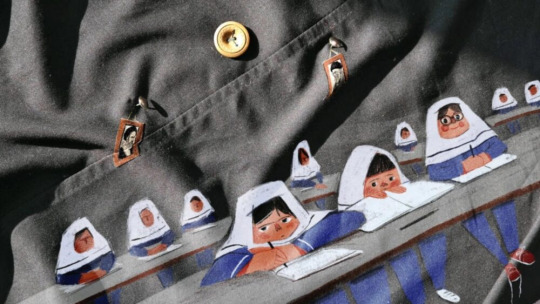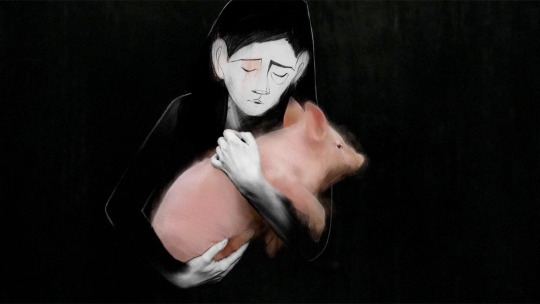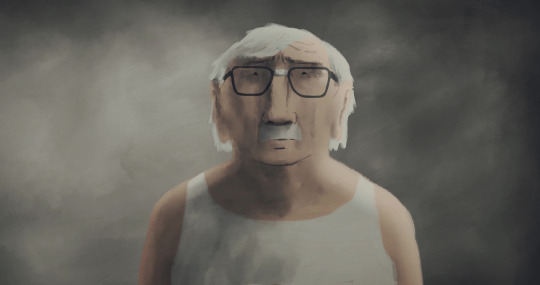#מכתב לחזיר
Explore tagged Tumblr posts
Text





Best Animated Short Film Nominees for the 96th Academy Awards (2024, listed in order of appearance in the shorts package)
This blog, since 2013, has been the site of my write-ups to the Oscar-nominated short film packages – a personal tradition for myself and for this blog. This omnibus write-up goes with my thanks to the Regency South Coast Village in Santa Ana, California for providing all three Oscar-nominated short film packages.
If you are an American or Canadian resident interested in supporting the short film filmmakers in theaters (and you should, as very few of those who work in short films are as affluent as your big-name directors and actors), check your local participating theaters here.
Without further ado, here are the nominees for the Best Animated Short Film at this year’s Academy Awards. The write-ups for the Documentary Short and Live Action Short nominees are complete. Films predominantly in a language other than English are listed with their nation(s) of origin.
Yet again, this completes this year’s omnibus write-ups for the Oscar-nominated short films for the upcoming Academy Awards:
Our Uniform (2023, Iran)
Director Yegane Moghaddam used to be a primary school teacher in Iran and often “observed the students… struggling with their uniforms and headscarves all day.” These observations informed her film and narration in Our Uniform, which won Best First Film at Annecy (the largest animation-only film festival, in the French Alpine resort town of the same name) in 2023. Only the fourth ever non-Western/European and non-Japanese nominee in this 92-year-old category – following 2014’s Bear Story (Chile; that year's winner), 2020’s Opera (South Korea) and 2021’s Bestia (Chile) – Our Uniform adopts a unique style never before seen in this category. Instead of traditional cel animation with ink and paper or computers, Moghaddam nearly single-handedly painted images directly on clothing fabrics (pants, jackets, shirts, scarves – all from her personal wardrobe) to illustrate the memories her narration shares. These memories, of attending public school in Iran, invariably intersect with Iran’s theocratic politics. There are references, never pedantic, about government propaganda as part of the school curriculum, and the segregation between boys’ and girls’ education. Most vividly, Moghaddam remarks on the restricting school uniform and compulsory hijabs for girls at school, issues which enflamed protests against such laws beginning in 2017 (and spiking after the death of Mahsa Amini in 2022).
Moghaddam, who cites graphic novelist/director Marjane Satrapi (2007’s Persepolis, 2011’s Chicken with Plums; the former I consider among the finest animated films of this young century) as her primary artistic inspiration, curiously does not contain as much messaging in her film as one might expect. As an Iranian citizen who currently has no plans to officially distribute the film within her home nation due to fear of retribution, how could she? But the film’s slightness cannot distract from its painstaking, loving artistry. Without relying on inventive camerawork, Moghaddam uses the natural pockets and folds of her clothes to suggest dimension and personality. To Moghaddam, all clothing has a personality and personal history to the wearer, even compulsory clothing, all of which she uses to wonderful effect. What originally began as a fun side project that Moghaddam had no expectations for gifts audiences a truly original viewing experience.
My rating: 7.5/10
Letter to a Pig (2022, Israel/France)
Qualifying for the Academy Awards after winning the Grand Prize for Best International Short Film at Anima, the Brussels Animation Film Festival, in early 2023, Nal Kantor’s Letter to a Pig sees a Holocaust survivor retelling a story of survival to a group of largely disinterested and scornful teenagers. As the elderly man recounts how he wrote a letter to a pig that inadvertently saved his life, a handful of students start insensitively snorting. Quietly, Letter to a Pig adopts the standpoint of one of the girls in class, half-listening at first. Here, Kantor seamlessly switches between the man’s memories and the reality of the classroom, through heavy rotoscoping to outline her figures, mixing it with live-action footage for the limbs or eyes, but only using a few ink scribbles to outline facial features and hair. Generally, the more movement either the schoolgirl or Holocaust survivor show, the more scribbles and live-action footage that appear. For all other figures, they remain mostly abstract.
As a young man, the Holocaust survivor recalls how filled with rage he was, long after his near-death encounter. Now, physically unable to exact retribution on those who harmed him, he tells the students “you are my revenge” – passing along his trauma to those not realizing what they have just received. The schoolgirl’s vision in the surrealistic final minutes is her absorption of the Holocaust survivor’s story. This masterfully drawn finale is the emotional apex of Letter to a Pig, fully justifying its black-and-white palette (with one exception: pink for the pigs, considered an impure animal in Judaism) in service for its profound sense of dread. Symbolizing memory, the pig appears throughout the film as a savior, a monster, or something worthy of mockery, depending on who is on screen. It is in these final moments Letter to a Pig leaves the audience with pressing questions. Can one impart painful memories without the trauma that gives such memories form? Most urgently, can we choose not to act on the trauma we inherit? May it be possible not only in dreams.
My rating: 8.5/10
Pachyderme (2022, France)
Stéphanie Clement’s Pachyderme, like Letter to a Pig, is an unsettling short film that delves deeply into the mind of a troubled character. In this film, a young woman named Louise (Christa Théret) recalls her days visiting her grandparents in Provence (southeastern France) during her childhood. The sun-bathed rural landscape is picturesque, the grandparents’ house gorgeously stylized. Beyond this, some of Louise’s recollections feel incomplete, with no apparent structure or chronology. That might read as a criticism, but Clement and screenwriter Marc Rius fully intend for Pachyderme to seem fragmented. The film strongly implies – and some viewers will pick this up earlier or later than others – that the grandfather sexually abused Louise. In reaction, Louise, while recounting her memories for the audience, has repressed her memories and is showing signs, in her narration and in her visual recollections, of disassociation. I do not recall ever seeing disassociation, a common symptom of those who have been sexually abused, portrayed as cinematically as seen in Pachyderme. It is best exemplified, metaphorically, in the scene where our protagonist disappears into the wallpaper (this scene was originally the first bit of test footage made for the film).
But perhaps there is no better visualization of all Pachyderme has to say than the moment where Louise’s grandfather notices her index finger bleeding. He grasps her hand, and his hands dwarf hers. The simultaneity of Pachyderme’s picture book visuals and its horrifying implications show the viewer a woman who has not fully processed what has happened to her. It is not helped by the defensiveness of Louise’s grandmother following the grandfather’s death. Family denial, too, is playing a role in how Louise is choosing, consciously and subconsciously, to remember the past. In its eleven minutes, Pachyderme passes in a dreamlike haze, its illusory moments enabling the viewer to more closely connect to Louise’s (both the young adult narrating the film and the child on-screen) feelings. Unlike many nominees in Best Live Action Short Film down the years that addressed childhood trauma (it's a long-running trend for that category), Pachyderme prioritizes healing in as cinematic a way as possible.
My rating: 8.5/10
Ninety-Five Senses (2023)
If the names Jared and Jerusha Hess are familiar, that is because this husband-and-wife directorial team also made Napoleon Dynamite (2004) and Nacho Libre (2006). Some of those same comedic sensibilities carry over to Ninety-Five Senses, which qualified for the Academy Awards by winning Best Animated Short at the Florida Film Festival in 2023. The film features an old man named Coy (Tim Blake Nelson, a Coen Brothers regular whose voice fits the narrative here) reflecting back on life – a reverie that jumps, hops, and skips across time and place. At first, Ninety-Five Senses, with its wildly shifting style changes, does not seem to have much of a point or purpose. But the film gradually reveals itself: first through the subtle shading of what appear to be prison bars and, later, the mountain of discarded food cartons sitting on the table in front of Coy. We soon realize that Coy is in the final hours or minutes of being on death row, and he is describing to the audience his internal peace before he meets his fate.
Ninety-Five Senses is not here to make a point about capital punishment, incarceration, or the terrible actions that landed Coy in prison. Foremost, this is a film that attempts to capture the last gasp of humanity of an individual before their execution. In contrast with the drab grays whenever Coy is seen in his cell, his flashbacks are intense – a fount of color, with both crude and elegant character designs, hand-drawn and computer-generated (sometimes appearing side-by-side). Not every vignette – of which there are five, one for each human sense – showcases as much aesthetic excellence as the others, such as an early instance where Coy recounts his childhood. That vignette does not evoke the respective human sense it covers as well as it thinks it does; the art style of that vignette also recalls hand-drawn television animation, but flows too smoothly to exactly replicate it. In any case, this is a promising first foray into animated film for the Hesses.
My rating: 8/10
War Is Over! Inspired by the Music of John and Yoko (2022)
War Is Over! (you cannot make me write or say the full title ever again) has the basics of a promising animated short film. Yet its simplistic take on humanity and warfare and close association with John Lennon and Yoko Ono’s “Happy Xmas (War Is Over)” condemns the film as pure hogwash. On second thought, I retract “hogwash”. That is an insult to Letter to a Pig and to porcine animals. This is self-congratulatory treacle from director Dave Mullins and co-writer Sean Ono Lennon (the son of John and Yoko). In a supposedly alternate World War I reality, a pigeon delivers messages between an Allied and a Central Power soldier on opposite sides of No Man’s Land. The messages contain chess notation, as they, somehow, began a game of chess with each other without ever meeting. One day, at presumably Christmas, the two armies inexplicably charge toward each other and, amid gunfire and a mass mêlée that should leave many more soldiers dead than shown, our two soldiers encounter each other on the battlefield in combat shorn of its gruesomeness.
Despite the film using the Unreal Engine for its animation, I admire the film’s lighting effects, character movements, pigeon animation, sound effects, and art direction for the otherwise sanitized trenches. That may be all the positives I can offer.
The contrived scenario sinks even further when our two chess-playing soldiers discover a critical message from their pigeon messenger. Cue the second-most embarrassing needle drop among this year’s fifteen short film nominees (somehow, the closing moments of The After are worse than this). Unlike The After, War Is Over! feels as if constructed around its respective song. Is this now a glorified music video? In an instant, the film reduces the tragedy of the Great War to something akin to a soft drink commercial or that “Imagine” video (could we stop disrespecting John Lennon and his fellow Beatles?). The sanitized depiction of war and farfetched resolving actions undercut the film’s message, embarrassing itself as it lurches through its excruciating final minutes. That the first credit in the end credits read “music and message by John and Yoko” rather than director Dave Mullins leaves an even more sour taste. At the heart of War Is Over!, Mullins and Sean Ono Lennon want us to know that war is bad. I never could have guessed!
My rating: 4/10
^ Based on my personal imdb rating. My interpretation of that ratings system can be found in the “Ratings system” page on my blog. Half-points are always rounded down.
From previous years: 85th Academy Awards (2013) 87th (2015) 88th (2016) 89th (2017) 90th (2018) 91st (2019) 92nd (2020) 93rd (2021) 94th (2022) 95th (2023)
Two other films played in this package as honorable mentions: Wild Summon (2023, dir. Karni Arieli and Saul Freed; 6/10) and I'm Hip (2023, dir. John Musker; 6/10).
For more of my reviews tagged “My Movie Odyssey”, check out the tag of the same name on my blog.
#Our Uniform#Letter to a Pig#מכתב לחזיר#Pachyderme#Ninety Five Senses#Ninety-Five Senses#War Is Over!#War Is Over! Inspired by the Music of John and Yoko#Yegane Moghaddam#Tal Kantor#Stéphanie Clément#Jared Hess#Jerusha Hess#Dave Mullins#Sean Ono Lennon#Tim Blake Nelson#96th Academy Awards#Oscars#31 Days of Oscar#My Movie Odyssey
7 notes
·
View notes